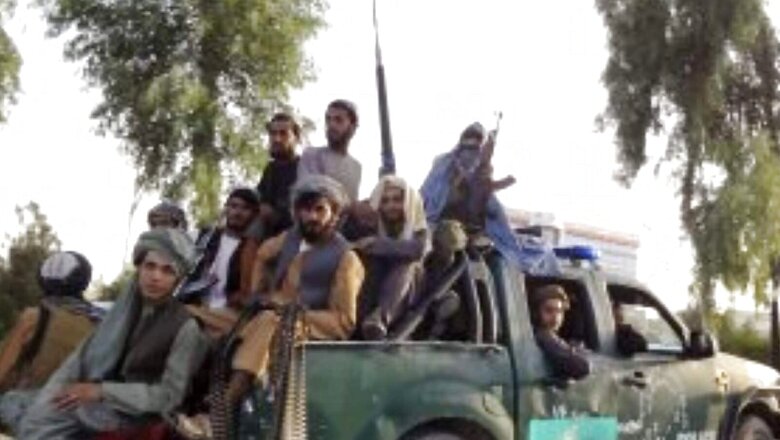
views
With the touchdown of top Taliban leaders Mullah Baradar and Haqqani Network’s Sirajuddin Haqqani in Afghanistan on a Qatar Air Force aircraft, the arrival of the new Islamic Emirate Taliban regime is now imminent. On his arrival in Kabul, Taliban deputy leader Anas Haqqani, who was also part of the Doha talks, went to meet Hamid Karzai in presence of Abdullah Abdullah and later interacted with Jihadi Mujahideen leader Gulbuddin Hekmatyar to assure them of their safety and security. Taliban’s outreach for a broader consensus is being seen as a move to show Taliban in positive and humane light amidst growing anger against United States and Ashraf Ghani for abandoning Afghans.
Taliban is on a publicity overdrive ever since Kabul’s takeover on August 15, trying desperately to portray a soft and a moderate image which they say is very different from the earlier Taliban days when public executions were common and women and girls were forced to stay indoors in a Niqab or a Burqa with no right to even have basic school education.
The press conference by Zabiullah Mujahid in Kabul’s Presidential Palace, however, indicated that Taliban will ensure women get all rights and there is no discrimination but this can only happen under framework of the ‘Islamic Sharia law’. And nobody can speak or report against or be critical of the Sharia which is in their words the ‘national interest’. The rider of Sharia law with every statement makes Taliban gimmickry clearer by the day. This is old wine in a new bottle.
That said, Taliban taking over Afghanistan will make the country world’s biggest epicentre of extremism and terrorism in the coming months and years. Sunni extremism will get a new life with the arrival of the Islamic Emirate’s Taliban regime much worse than the Islamic State of Iraq and the Levant (ISIS) which was in no manner a state in all practicality.
The United States leaving behind a large dump of latest ammunition and weaponry apart from helicopters, planes and Humvees is a great stockpile for Taliban’s defence and security requirements for a long time. The extent of the loss and what future holds can be gauged with the fact that United States had equipped a 300,000 Afghan Army with latest guns and other ammunition which are now in the hands of the Taliban.
Is Taliban threat imminent in Jammu & Kashmir?
The implications of the rise of Sunni extremism may not mean direct imminent threat to Indian Union Territory of Jammu & Kashmir but Pakistan in its direct neighbourhood. The way to Jammu & Kashmir from Kabul goes through Pakistan. Pakistani terrorists training in Taliban camps of Afghanistan may end up burning their own house first in Pakistan on their long journey to Kashmir meadows.
Pakistan in the coming years will see an exponential rise in Sunni and Wahabi extremism as a direct consequence of Taliban’s Kabul takeover courtesy Rawalpindi. The desecration of Maharaja Ranjit Singh statue in Lahore by Tehreek-e-Labbaik men is just an example of extremism boiling. On the other hand, 400 men molesting, assaulting attempting to rape a girl publicly at Minar-e-Pakistan in Lahore is another shocking event. The TikToker was stripped and flung into air repeatedly by the mob. Islamabad is just beginning to reap fruits of Taliban takeover in Afghanistan which will only impact the Pakistani society more every passing day.
But, will Pakistan be able to dictate terms to the new Taliban regime in Afghanistan, the way it has been to date in return for a safe haven on Pakistan soil?
Pakistan played a key role in Doha peace talks which even led to a US-Taliban agreement earlier this year where America committed to withdraw its troops from Afghanistan by September 11 this year. The events of August, however, when Taliban took over Afghan provinces one after the other, resulted in a forced capture of power in Kabul by the Taliban.
In the run-up to the troop withdrawal deadline, Taliban walked back on several commitments. Suicide bombings in Kabul and other provinces of Afghanistan continued as did other terror related activities. Innocents continued to be targeted even in schools, universities and hospitals apart from high-profile targets in the Afghan government and security forces.
Pakistan would have had a leverage on Taliban had they come through a step by step approach through negotiations as was committed in Doha. On the other hand, the United States will also now stop depending on Pakistan as much as it did earlier. Islamabad would, however, want its fair share in the new Taliban regime through its proxies.
Will India engage with the Taliban?
India, however, cannot ignore the realities of the region after Taliban’s homecoming and helplessly watch Pakistan and China flex their muscles in the region. New Delhi will have to initiate a serious backchannel dialogue with Taliban, that is, if it isn’t already underway.
India’s large Muslim population is a fact that Taliban cannot ignore. The Taliban leadership would prefer a direct channel of dialogue with New Delhi rather than poking its nose in internal issues of India, including Jammu & Kashmir. Taliban’s official policy that Kashmir is a bilateral issue says a lot about its approach in matters of diplomacy and international relations. The view has been favourable to India until now and Taliban wouldn’t want to open gates of another regional conflict without establishing its rule and writ over the newly captured territories.
Yet India will have to be careful and alert in Jammu & Kashmir as terror attacks may still see a rise if not immediately than in months or years from now. Taliban’s rise has given a new life to terror groups such as Jaish-e-Muhammad and Lashkar-e-Taiba who have had terror training camps in Afghanistan for years. The Mujahideen who entered Kashmir in 1990 often were trained in the camps of Mullah Omar in Afghanistan. Taliban would also not forget the fighting spirit of Pakistani terror groups against the Afghan and US forces in the run up to the fall of Kabul.
While New Delhi begins to analyse this new normal, Taliban in itself has challenges galore — biggest being how to govern, pay salaries and keep the ethnically divergent nation on the same page.
The latest protests in Jalalabad, Khost and Kunar against Taliban by the common Afghans displaying the Afghan tricolour flag and removing the Taliban white flag with Shahada inscribed on it in green, is in itself a defining image of public anger and frustration. If Taliban is unable to keep the provinces together, the local warlords will be at advantage and make good use of the trained young Afghan soldiers who would be now jobless in the new regime. The war cry from Panjshir by Amrullah Saleh who declared himself as the caretaker President of Afghanistan is yet to be tested or see light of the day.
The moot question, however, remains: Will the 300,000 Afghan soldiers, who sacrificed someone in their family or friends in the war over last many years and saw Taliban brutality and suicide bombing up close, ever accept 75,000 Taliban fighters as fellow comrades in the new Islamic Emirate regime?
Aditya Raj Kaul is Contributing Editor, News18 group with more than a decade long experience in covering Conflict, Foreign Policy, and Internal Security. He can be reached at [email protected]
Read all the Latest News, Breaking News and Assembly Elections Live Updates here.



















Comments
0 comment